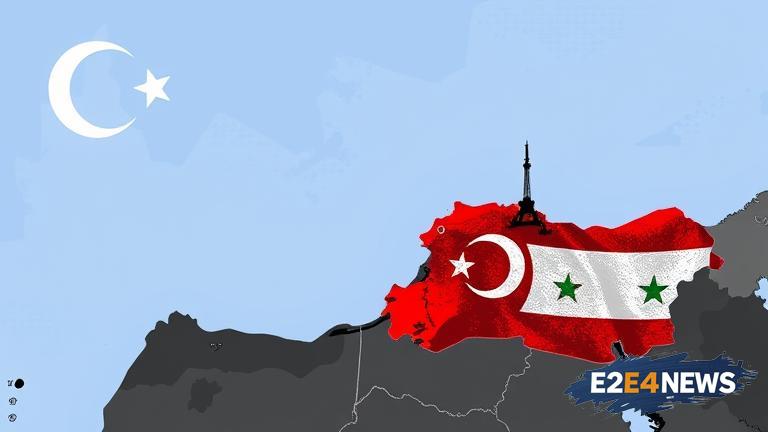The recent escalation of tensions between Turkey and Israel, particularly in relation to the Syrian conflict, has brought to the forefront the complex geopolitical dynamics at play in the Middle East. Turkey, under the leadership of President Recep Tayyip Erdogan, has been vocal about its opposition to Israel’s actions in Syria, which Ankara views as a violation of Syrian sovereignty and a threat to regional stability. The Turkish government has consistently called for an end to Israeli aggression in Syria, emphasizing the need for a peaceful resolution to the conflict. Israel, on the other hand, has maintained that its actions in Syria are necessary to protect its national security interests, particularly in relation to the presence of Iranian forces in the country. The Syrian conflict, which began in 2011, has resulted in the deaths of hundreds of thousands of people and the displacement of millions, with various regional and international actors involved in the conflict. Turkey has been a key player in the conflict, providing support to certain rebel groups and maintaining a significant military presence in northern Syria. Israel, meanwhile, has carried out numerous airstrikes in Syria, targeting Iranian and Hezbollah forces, which it views as a threat to its security. The United States, a key ally of Israel, has also been involved in the conflict, providing military support to certain rebel groups and maintaining a presence in eastern Syria. The Russian government, which has been a key backer of the Syrian regime, has also been involved in the conflict, providing military support to the Syrian government and maintaining a significant presence in the country. The European Union, meanwhile, has been critical of Israel’s actions in Syria, calling for a peaceful resolution to the conflict and an end to the violence. The Turkish government has also been critical of the EU’s response to the conflict, accusing Brussels of failing to take adequate action to address the crisis. In recent months, tensions between Turkey and Israel have escalated, with Ankara accusing Tel Aviv of violating Syrian sovereignty and threatening regional stability. The Turkish government has also accused Israel of supporting Kurdish militant groups in Syria, which Ankara views as a threat to its national security. Israel, meanwhile, has accused Turkey of supporting Islamist groups in Syria, which Tel Aviv views as a threat to its security. The conflict in Syria has also had significant humanitarian implications, with millions of people displaced and in need of assistance. The Turkish government has been a key provider of humanitarian aid to those affected by the conflict, with Ankara maintaining a significant presence in northern Syria. The international community has also been critical of the humanitarian situation in Syria, with the United Nations and other organizations calling for an end to the violence and increased access to humanitarian aid. Despite the challenges, there are signs that a resolution to the conflict may be possible, with various regional and international actors engaged in diplomatic efforts to bring an end to the violence. The Turkish government has been a key player in these efforts, with Ankara maintaining a significant diplomatic presence in the region. The Russian government has also been engaged in diplomatic efforts, with Moscow maintaining a significant presence in the region. The United States, meanwhile, has been critical of the Russian government’s actions in Syria, accusing Moscow of propping up the Syrian regime and exacerbating the conflict. The European Union has also been critical of the Russian government’s actions, calling for an end to the violence and a peaceful resolution to the conflict. In conclusion, the situation in Syria remains complex and challenging, with various regional and international actors involved in the conflict. The Turkish government’s critical stance on Israel’s actions in Syria is crucial for regional stability and Turkish national interests, and Ankara’s diplomatic efforts will be key to bringing an end to the violence and finding a peaceful resolution to the conflict. The international community must also play a role in addressing the crisis, with increased humanitarian aid and diplomatic efforts necessary to bring an end to the violence and promote regional stability. The conflict in Syria has significant implications for the broader region, with the potential for escalation and further violence. The Turkish government’s response to the crisis will be crucial in determining the course of the conflict, and Ankara’s diplomatic efforts will be key to promoting regional stability and finding a peaceful resolution to the conflict.
